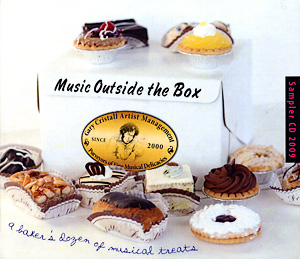|
Home Contact: Phone: Email:
|
||
|
|
||
|
||||
| Band
bios Press: EYE WEEKLY | EL POPULAR WEEKLY | NOW | DAILY JOURNAL | HAMBURG |
||||
|
ELIANA CUEVAS - PRESS BY ERROL NAZARETH Thankfully, this isn't the case. Reached by phone in Fredericton, where she and her band performed at the city's Harvest Jazz and Blues Festival, Cuevas speaks passionately about her creative process and musical philosophies. "I wanted to move away from the typical salsa sound, not because I have anything against it -- I love listening to it and dancing to it -- but it's just not me," she says. "On my first EP [2002's Cohesion], I had a bigger group. I had three horns and a drum set and it was good, but I wanted something more acoustic this time. "I think that for my voice and the type of songs I write, it works better 'cause I like to focus on the lyric," Cuevas says. "If there's more space, the listener can pay more attention to the words and they won't be overwhelmed by a big sound and intricate arrangements. Cuevas credits this approach to her prior experience singing in
a Brazilian group; the music really resonated with her because "there's
a gentleness to it and it matched my personality more. I think that
a lot of times people's personalities come through in their music
and that's why I wanted something more intimate and simple."
"It's a poem written by my father to my mother," she says. "He wrote it to her before I was born. He was just expressing how much he loves my mother and wished he could create a new language to express that to her." Cuevas is fond of saying she likes simplicity, but this shouldn't be interpreted as a preference for music that doesn't have brains. Veteran bassist George Koller, who plays on Ventura, raves about Cuevas' compositional skills. "She writes all of her material and a lot of it involves advanced harmony and rhythm. That's very rare for someone her age," he says. "As a
musician, it's very satisfying intellectually and rhythmically to
play this music because you have jazz harmony and Latin rhythms
so your whole body and brain is involved. "She's got a lot
going for her." |
||||


